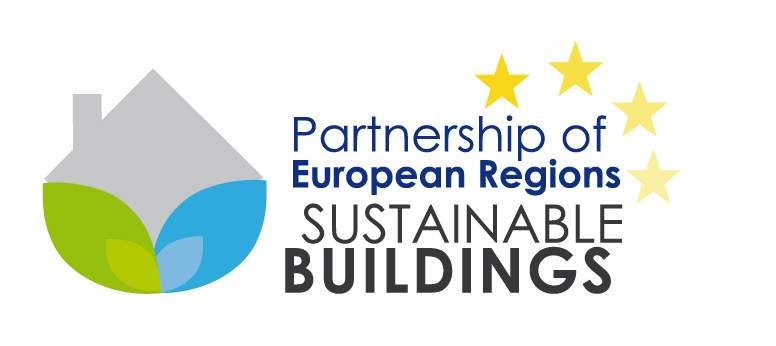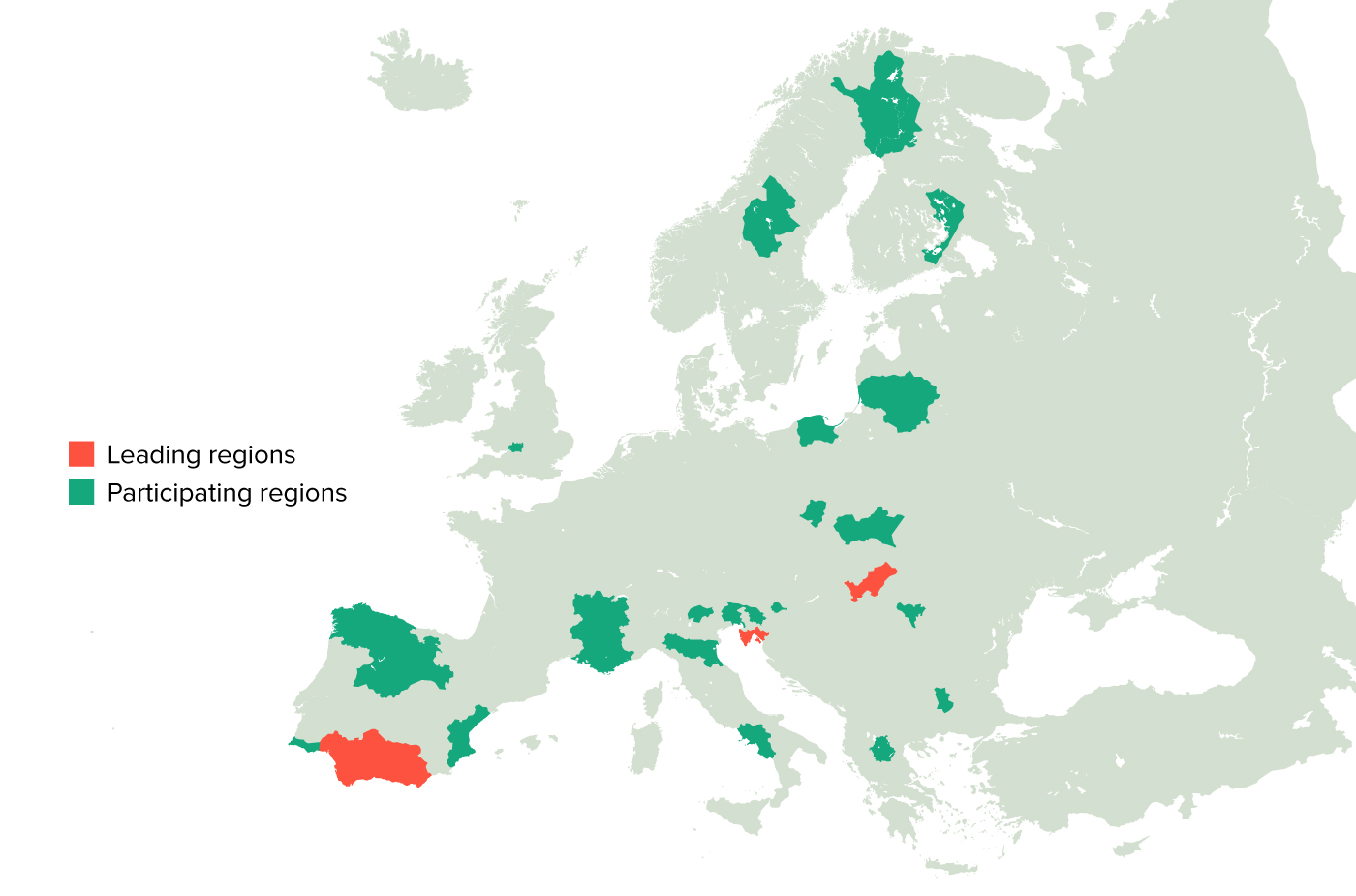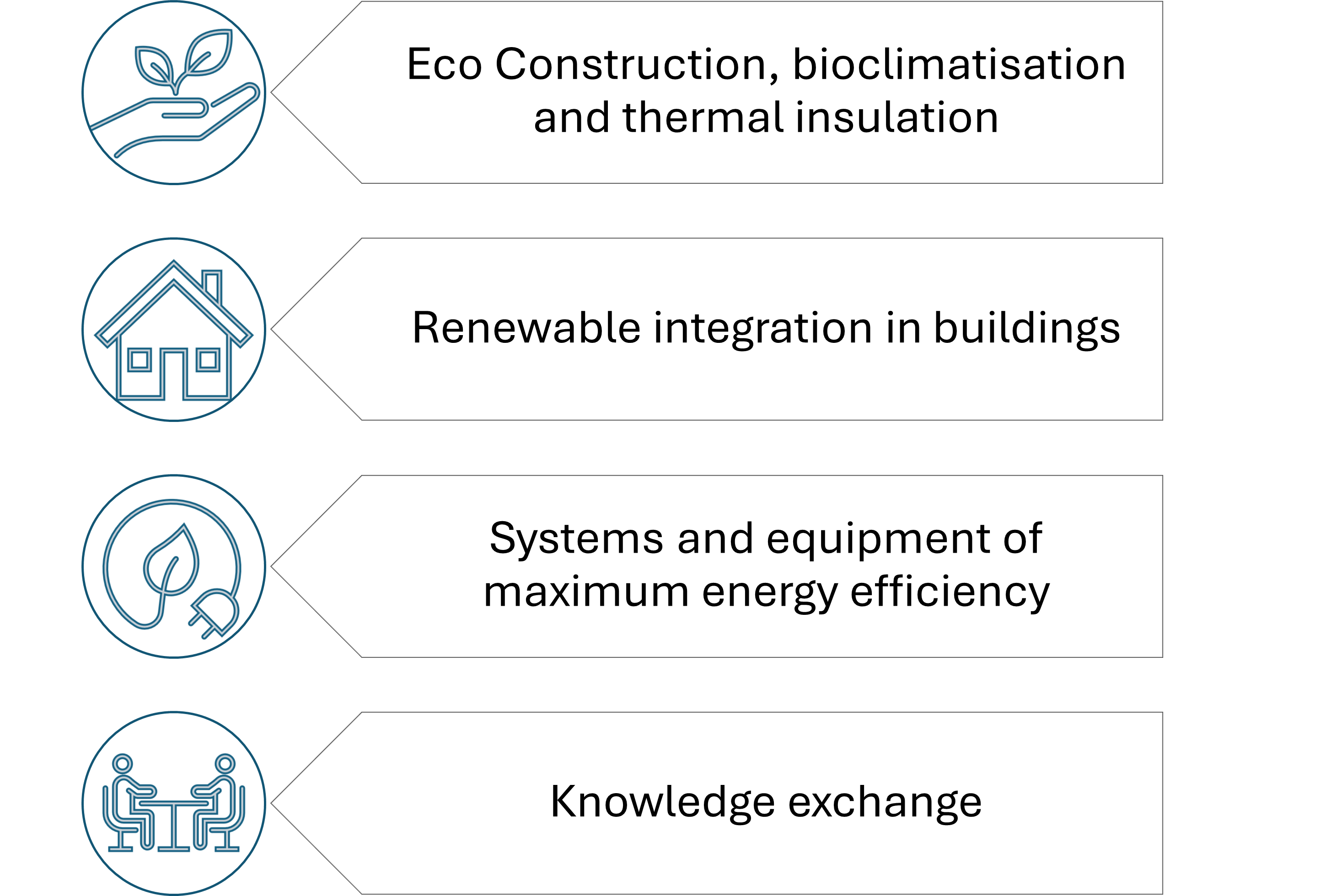Sustainable buildings
Context
The European Union set the target of economy-wide climate neutrality by 2050, meaning a long-term goal of a decarbonised building stock by 2050. Buildings account for 40% of final energy consumption in the European Union and 36% of its energy-related greenhouse gas emissions, while 75% of EU buildings are still energy-inefficient. By improving the energy efficiency of buildings, the total EU energy consumption could be reduced by 5-6% and CO2 emissions lowered by about 5%. The Sustainable Building Partnership was created in October 2016, taking into consideration that interregional collaboration is a key opportunity based on regional Smart Specialisation Strategies.
Year established: 2016

Regions (lead and partner)
- Leading regions: Andalusia (ES), North Great Plain (Észak-Alföld) (HU), North West Croatia (HR)
- Participating regions: Alba County (Centru) (RO), Algarve (PT), Asturias (ES), Autonomous Province of Trento (IT), Campania (IT), Castile and Leon (ES), Central Slovenia (SI), Drava (Podravska) (SI), Emilia-Romagna (IT), Friuli-Venezia Giulia (IT), Gloucestershire (UK), Jämtland (SE), Kaunas County (LT), Lapland (FI), Lithuania (LT), Malopolska (PL), North Karelia (FI), Opolskie (PL), Plovdiv (BG), Podkarpackie (PL), Pomorskie (PL), Rhône-Alpes (FR), South Karelia (FI), South Region (Provence-Alpes-Côte d'Azur) (FR), Upper Carniola (Gorenjska) (SI), Valencia (ES), Galicia (ES), Western Macedonia (EL)

Mission
The Partnership on Sustainable Buildings is conceived as a strategic alliance between European regions to boost new markets and take advantage of regional opportunities for smart specialisation in sustainable buildings. This interregional collaboration between public and/or private entities within the Partnership, aims to improve the energy efficiency of buildings in Europe, through promoting the development of efficient and innovative solutions throughout the value chain, associated to energy saving and the use of renewable energy in buildings.
Objectives
- Improve energy efficiency of buildings equipment’s and installations and innovations in new materials, components and construction solutions that minimise the energy consumption during manufacture, assembly and operation.
- Solutions that seek the maximum environmental protection and the quality of life of people, with special attention to the design of low cost solutions aimed at the most disadvantaged groups.
- Consolidation of a business network and the generation of new business and employment opportunities aimed at creating value around energy efficiency and the implementation of renewable energy in buildings.
- More effective deployment, upscale and market uptake of technologies in the field of sustainable construction.
- All of the above will contribute to taking advantage of new opportunities for economic development, environmental improvement, and social and territorial cohesion.
Main activities
Main topics:
- Eco Construction, Bioclimatism and thermal insulation: New materials with low carbon footprint, Innovative constructive processes: light prefabrication of low-cost housing, advanced manufacturing for new construction elements, Bioclimatic solutions based on plant elements;
- Renewable integration in buildings: Climatisation with renewable energies, Self-consumption and energy storage, Low cost solutions aimed at vulnerable groups;
- Systems and equipment of maximum energy efficiency: Innovative solutions of high energy efficiency, Smart energy management systems and IoT, Advanced solutions for energy rehabilitation of historical heritage buildings.
- Knowledge exchange has been provided through information bulletins, videoconference and meetings, facilitating information regarding new join projects among the entire value change. Based on a quadruple helix approach the partnership works with regions that share a common vision of improving living conditions of citizens through more sustainable buildings.

Organisations involved
Belgium:
- Cluster Flanders Innovation and Entrepreneurship (BE)
Croatia:
- North-West Croatia Regional Energy and Climate Agency (HR)
- University of Zagreb (HR)
Czech Republic:
- Czech Technical University in Prague (CZ)
Finland:
- Lapperanta University (FI)
- Karelia University of Applied Sciences (FI)
France:
- Aix Marseille University (FR)
Italy:
- Clust-ER BUILD (IT)
- ART-ER Attractiveness Research Territory (IT)
- Università Degli Studi Di Udine (IT)
- Università Degli Studi Di Trieste (IT)
Lithuania:
- University of Kaunas (LT)
Poland:
- Slaskie Construction Cluster (PL)
Portugal:
- Enercoutim Industry (PT)
- Nova University of Lisbon (PT)
- University of Faro(PT)
Slovenia:
- University of Ljubljana (SI)
- University of Primorska (SI)
- TECES Energy Efficiency and Energy Conversion Cluster, Podravska (SI)
Spain:
- University of Almeria, Jaén and Málaga (ES)
- Valencia Institute of Building (ES)
- Galician Wood and Design Cluster ( ES)
Other:
- Cluster Digipolis
Shared smart specialisation areas
Some of the shared smart specialisation areas include the transformation of the construction sector in Construction Industry 5.0 through the application of industrialisation and digitalisation, with a commitment to the innovation, sustainability, circularity and competitiveness with the incorporation of new ICT management systems, the connectivity of buildings, the preventive maintenance and waste reduction
Related projects
Ongoing projects:
- SMARTeeSTORY: Integrated, interoperable, smart and user-centred building automation and control system of non-residential historic buildings applied to 3 demo sites. Horizon Europe https://www.smarteestory.eu/
- EXCESS: FleXible user-CEntric Energy poSitive houseS, Horizon Europe https://positive-energy-buildings.eu/ with 3 pilot projects. Horizon Europe
- REC4EU: Renewable Energy Communities for EU Regions, Interreg Europe https://www.interregeurope.eu/rec4eu
Related projects:
- POWERTY: Renewable energies for vulnerable groups including 3 pilot projects. Interreg Europe. https://projects2014-2020.interregeurope.eu/powerty/ (2019-2023)
- Interregional Innovation Partnership "Smart Campus" pilot aimed at developing innovative solutions in several university campuses, leading to a more efficient and innovative energy generation, distribution and use in existing or new buildings including business cases. (2018-2020)
- As a result of the about mentioned project, a more in-depth interregional collaboration project was developed under the Interreg Europe Programme. S3UNICA: Smart Specialization University CAmpus. (https://projects2014-2020.interregeurope.eu/s3unica/)(2019-2023)
- EERADATA: Data-driven decision-support to increase energy efficiency through renovation in European building stock. Horizon Europe https://cordis.europa.eu/project/id/847101/reporting (2019-2021)
- IMIP: Innovative Eco-Construction System Based on Interlocking Modular Insulation Wood & Cork-Based Panels. Interreg Sudoe https://interreg-sudoe.eu/en/proyectos/innovative-eco-construction-system-based-on-interlocking-modular-insulation-wood-cork-based-panels/ (2020-2023)
- BUILD2LC: Boosting low carbon innovative building rehabilitation in European regions. Interreg Europe (https://projects2014-2020.interregeurope.eu/build2lc/) (2016-2021)
Contact
Andalusia (ES)
- Joaquín Villar, joaquin.villar@juntadeandalucia.es
- Marisa Borra, marialuisa.borra@juntadeandalucia.es
North Great Plain (Észak-Alföld) (HU)
- Gábor Vámosi, vamosi.gabor@lenergia.hu
- Anita Petrucz, petrucz.anita@lenergia.hu
North West Croatia (HR)
- Marko Zlonoga, mzlonoga@regea.org
- Valentina Đurek, vdurek@regea.org
Latest news and upcoming events
A combined event was organised in November 2022 between the TSSP on sustainable construction and advanced materials for batteries for electro-mobility and stationary energy storage. During the event, opportunities for partnerships and the new financial instruments were presented.
The sustainable buildings partnership was invited to attend the 4th PRI Plenary Interregional Cooperation in December 2022 and the 5th PRI Plenary Interregional Cooperation in February 2023.The partnership will be based on current relations among partners as well as videoconferences, and e-Bulletins, specially from the experience derived from implemented projects.
Next for the partnership will be the improvement of collaboration and finding a common goals through the already agreed contracting service of rescoping. Interest will also be tested regarding position papers and organisational improvements for the dissemination and cross-fertilisation activities, and continuation of searching financial opportunities.

